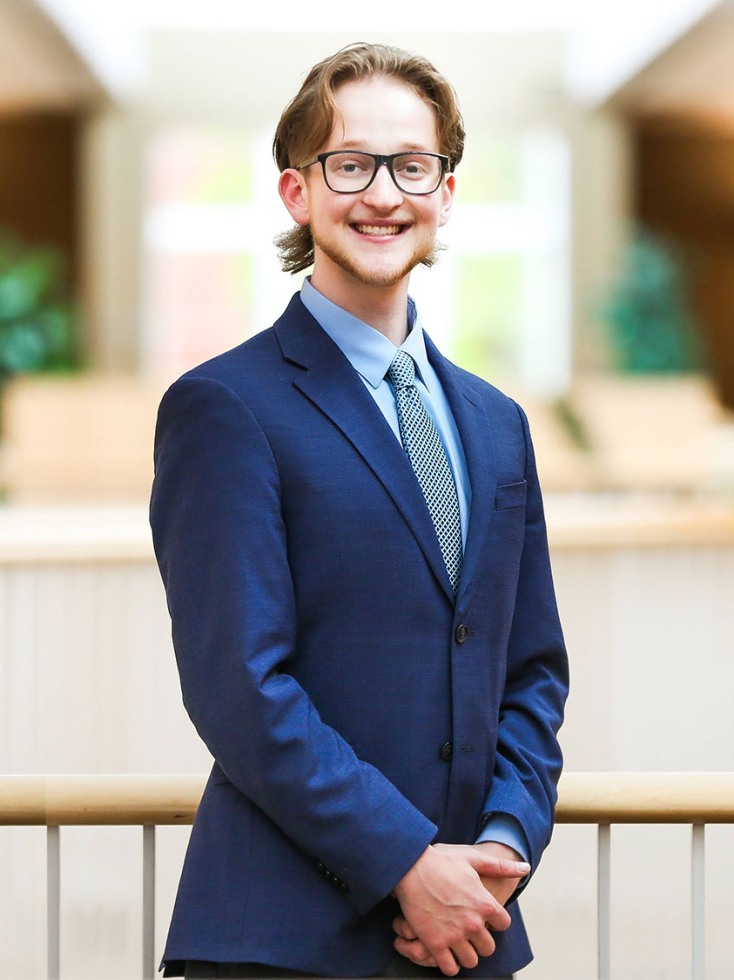Determined to cut his own path, Adams decided to concentrate in religious studies and environmental studies. Time spent with religious family members exploring the deserts of Nevada and pine forests of Minnesota made him curious about the possibility of harnessing religion to spark climate action and preserve these treasured landscapes. But the pull of policy and politics remained strong. "I took many religious studies classes and thoroughly enjoyed them," said Adams, "but I noticed I always ended up writing a variation of the same paper about climate change and coalition building, which led me back to policy and politics."
"I realized the tools I wanted to use came from sociology and political science," said Adams. “I wanted to understand things like distributive conflict between carbon-intensive industries, environmentalists and labor unions, and IAPA was where I could do that.”
During his time at Brown, Adams spent four years working as a reporter for "Possibly," a radio program focused on sustainability science and the environment hosted by The Public's Radio and housed at the Institute at Brown for Environment and Society (IBES). Starting his freshman year, he also became a writer and interview associate for the Brown Political Review.
Adams said his time working on "Possibly" showed him "there is no singular path to progress and that solutions must come from across the spectrum. Being an environmental journalist allowed me to shine a light on this diversity and help its efforts grow by sowing the seeds of curiosity that lead to action. I will take these lessons with me wherever I go." It also reaffirmed his interest in policy as he worked on stories about the climate benefits of the Inflation Reduction Act, which later became the focus of his honors thesis.
Another formative experience was participating in the Brown in Washington Program during his sophomore year. "I wanted to see how it would feel if I went all in on politics and policy, so I applied," he said. During his time in the program, Adams interned for Rhode Island Senator Sheldon Whitehouse, an experience he described as “incredible.”
"[Whitehouse's] areas of policy expertise align with my own in terms of climate change, dark money in the Supreme Court, and understanding the intersection between the two," said Adams. "Being around the scientists in his office and his entire Green Team was deeply inspiring," he said. "Learning from them and seeing their passion was the most influential part of that experience for me."
Upon returning from Washington and "all in" on policy and politics, Adams said he found a "home away from home" in IAPA. He became one of the leaders of IAPA's Department Undergraduate Group (DUG) and worked as a student aide in its administrative office. "I wanted to give back to a community that had given so much to me," he said. "Specifically, I wanted to make sure that students here understood all the resources they could take advantage of, which are practically infinite."
"There are so many events, fellowships, and study groups, as well as postdocs and fellows that hold office hours and are eager to talk," he said. “My greatest joy as a DUG leader was being able to help connect people with those resources and through that process, learn more about their interests.”
Adams said he enjoyed the opportunity to work with and get to know the IAPA staff, particularly the Manager of Academic Programs, Anita Nester and Academic Program Coordinator Michael Christopher, with whom he worked directly. "Anita has been so supportive," he said. “I think she, Professor [Nicole] Pangborn and Professor [Christopher] Rea, my primary thesis advisor, embody a lot of the traits of generosity, encouragement, and constant support that IAPA is known for.”
After graduation, Adams will start working as a policy regulatory analyst for the Inner City Fund (ICF). "I'll be working on their energy and electrification team," he said. “So I'll be doing policy work to put more electric vehicles on the road, develop solar and wind power, and help with energy efficiency programs.”
While he is excited about his immediate future, Adams said he might consider running for office at some point. "I'd like to work in the campaign world before seriously considering that," he said. “But I think there is a unique window of opportunity right now in the Democratic Party because there's no clear leadership or dominant personality. I think that opens up new possibilities, and that's exciting for someone young like me who wants to make a positive impact on the world.”
Adams said he believes it's time for fresh leadership in the Democratic Party. "I think young people are aware, especially at places like Brown, of the policy accomplishments of the Democratic Party," he said. But he sees a certain timidity about selling those policy accomplishments and a broader political narrative to the public. “I think that's why you see a lot of respect for Bernie [Sanders] among young people. He doesn't apologize for what he believes. Even on the right, many people say, 'I wouldn't vote for him, but I respect him, because he's been consistent with his message.'”
"I think that there's a simplicity to his message that should be instructive to young people looking to enter politics," said Adams. “He's spent his entire career saying the same thing — that the top 1% have been taking advantage of the rest of us. You have to figure out what the narrative is, crystallize rhetoric around it, and say it over and over and over again.”
For the moment, however, Adams says he's looking forward to learning more about climate and environmental policy at ICF. "I'm interested in contributing to the development of an environmental state that prioritizes justice and moves us toward a safer and sustainable world," he said. “And I think I can work on that in a number of ways, whether it's messaging for a campaign, working in the utility space, or at the national or state policy levels.”
